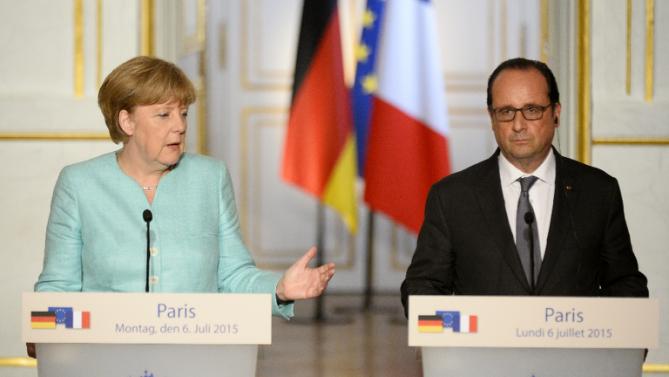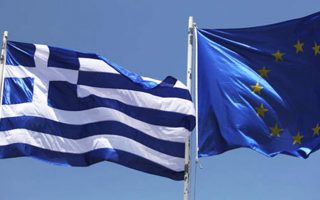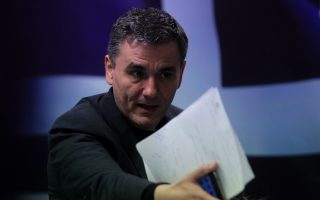Merkel proposed Grexit to Hollande before key Eurogroup in July 2015

Although the idea of Greece taking a five-year “time-out” from the euro was first made public at the July 11 Eurogroup last year, German Chancellor Angela Merkel had brought it up in conversation with French President Francois Hollande several days earlier, Kathimerini has learned.
The two leaders met in Paris on July 6, a day after some 61 percent of Greeks had voted against the bailout deal on offer from the country’s lenders. According to sources, at a dinner with Hollande, Merkel asked the French president his opinion about the idea of Greece leaving the single currency, at least for a few years.
Hollande made it clear that he did not believe this option would solve Greece’s problems and that it was highly unlikely there could be a temporary Grexit, and once out of the euro Greece would not return.
“Hollande does not say ‘no’ to her very often but when he does she knows that this really is a red line,” said a source with direct knowledge of the conversation between the two leaders. Following the French leader’s emphatic response, Merkel did not dwell on the subject and their discussion moved on to other matters.
It is thought that the idea of setting out the option of a Greek time-out was discussed when Merkel met her SPD coalition partner and Vice Chancellor Sigmar Gabriel and Foreign Minister Frank-Walter Steinmeier in Berlin on July 9. The three politicians are said to have agreed that it would be used as a way of pushing the Greek government toward accepting a new bailout deal at the ensuing Eurogroup.
The next day, 24 hours before the crucial meeting of eurozone finance ministers in Brussels, the idea was included in an e-mail sent by Thomas Steffen, Germany’s representative on the Euro Working Group that advises the Eurogroup, to key decision makers in the euro area. It also included the proposal – if Greece wanted to remain in the Eurozone – for it to be forced to accept the creation of a 50-billion-euro asset fund whose headquarters would be in Luxembourg as part of its commitments for a third bailout.
The Steffen paper, and they way Wolfgang Schaeuble used it to push for a Greek exit at the July 11 Eurogroup, went beyond the understanding he had reached with the chancellor and the leaders of the SPD.
“What shocked us about the non-paper was the way in which it set out the terms for Greece to remain in the euro,” said a German official with knowledge of the negotiations at the time. “They were so humiliating that the objective seemed to be for them not to be accepted by Greece.”





